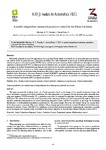Mostrar o rexistro simple do ítem
A model independent constrained predictive control for the Furuta Pendulum
| dc.contributor.author | Martínez, Blanca | |
| dc.contributor.author | Sanchis, Javier | |
| dc.contributor.author | García-Nieto, Sergio | |
| dc.date.accessioned | 2023-10-09T07:39:35Z | |
| dc.date.available | 2023-10-09T07:39:35Z | |
| dc.date.issued | 2023 | |
| dc.identifier.citation | Martínez, B. V., Sanchis, J., García-Nieto, S. 2023. A model-independent constrained predictive control for the Furuta Pendulum. XLIV Jornadas de Automática, 323-328. https://doi.org/10.17979/spudc.9788497498609.323 | es_ES |
| dc.identifier.isbn | 978‐84‐9749‐860‐9 | |
| dc.identifier.uri | http://hdl.handle.net/2183/33626 | |
| dc.description.abstract | [Resumen] Este trabajo presenta el control de seguimiento de un péndulo Furuta basado en el diseño de dos lazos paralelos con restricciones, rechazo activo de perturbaciones y predicción de salidas. Para cada subsistema, se asume que la planta gobernada tiene una dinámica de primer orden más integrador (FOPI). Así, se calcula una ley de control predictivo aplicando una estrategia de horizonte deslizante en dicha planta (FOPI). La diferencia entre la dinámica real y el modelo de predicción asumido se compensa mediante el mecanismo de rechazo de perturbaciones heredado del control activo de rechazo de perturbaciones (ADRC) e incorporado en los lazos. Para el diseño del control no se realiza ninguna identificación de modelos ni linealización matemática. Además, la estrategia permite incorporar las restricciones reales del sistema. Este trabajo valida con resultados prometedores la arquitectura denominada Modified Active Disturbance Rejection Predictive Control (MADRPC) mediante la estabilización de un sistema mecánico subactuado considerando las variables restringidas y en ausencia de un modelo nominal, en contraste con el enfoque estándar en el Control Predictivo de Modelos (MPC) en espacio de estados. | es_ES |
| dc.description.abstract | [Abstract] This paper presents the tracking control of a Furuta pendulum based on the design of two parallel-constrained loops with active disturbance rejection and outputs predictions. For each subsystem, it is assumed that the governed plant resembles firstorder plus integrator (FOPI) dynamics. So, a predictive control law is computed by applying a receding horizon strategy in such FOPI plant. The mismatch between the actual dynamics and the assumed prediction model is compensated through the disturbance rejection mechanism inherited from the Active Disturbance Rejection Control (ADRC) incorporated in the loops. No modelling identification or mathematical linearisation is performed for the control design. Moreover, the strategy allows the incorporation of the actual system constraints. This work validates with promising results the architecture named Modified Active Disturbance Rejection Predictive Control (MADRPC) by stabilising a sub-actuated mechanical system considering the constrained variables and in the absence of a nominal model, in contrast to the standard approach in the state-space Model Predictive Control (MPC). | es_ES |
| dc.description.sponsorship | Colombia. Ministerio de Ciencia, Tecnología e Innovación; Scholarship 885 | es_ES |
| dc.description.sponsorship | Generalitat Valenciana; CIAICO/2021/064 | es_ES |
| dc.language.iso | eng | es_ES |
| dc.publisher | Universidade da Coruña. Servizo de Publicacións | es_ES |
| dc.relation.uri | https://doi.org/10.17979/spudc.9788497498609.323 | es_ES |
| dc.rights | Attribution-NonCommercial-ShareAlike 4.0 International (CC BY-NC-SA 4.0) | es_ES |
| dc.rights.uri | http://creativecommons.org/licenses/by-nc-sa/4.0/ | * |
| dc.subject | Rechazo activo de perturbaciones | es_ES |
| dc.subject | Control predictivo | es_ES |
| dc.subject | Sistemas con restricciones | es_ES |
| dc.subject | Control multivariable | es_ES |
| dc.subject | Active disturbance rejection control | es_ES |
| dc.subject | Predictive control | es_ES |
| dc.subject | Constrained systems | es_ES |
| dc.subject | Multivariable control | es_ES |
| dc.title | A model independent constrained predictive control for the Furuta Pendulum | es_ES |
| dc.title.alternative | Control predictivo con restricciones e independiente de modelo para el p´endulo de Furuta | es_ES |
| dc.type | conference output | es_ES |
| dc.rights.accessRights | open access | es_ES |
| UDC.startPage | 323 | es_ES |
| UDC.endPage | 328 | es_ES |
| dc.identifier.doi | https://doi.org/10.17979/spudc.9788497498609.323 | |
| UDC.conferenceTitle | XLIV Jornadas de Automática | es_ES |
| UDC.coleccion | Publicacións UDC | es_ES |
| dc.relation.projectID | info:eu-repo/grantAgreement/AEI/Plan Estatal de Investigación Científica y Técnica y de Innovación 2017-2020/PID2020-120087GB-C21/ES/NUEVO METODO DE APRENDIZAJE POR REFUERZO MULTIOBJETIVO BASADO EN MODELOS. APLICACION A CONTROL PREDICTIVO/ | |
| dc.relation.projectID | info:eu-repo/grantAgreement/AEI/Plan Estatal de Investigación Científica y Técnica y de Innovación 2017-2020/PID2020-119468RA-I00/ES/DISEÑO, CONSTRUCCION Y CONTROL PARA LA GESTION OPTIMA DE MISIONES EN AERONAVES NO TRIPULADAS (UAVS) DE RANGO EXTENDIDO BASADAS EN PILA DE HIDROGENO Y PROPULSION DISTRIBUIDA/ |






